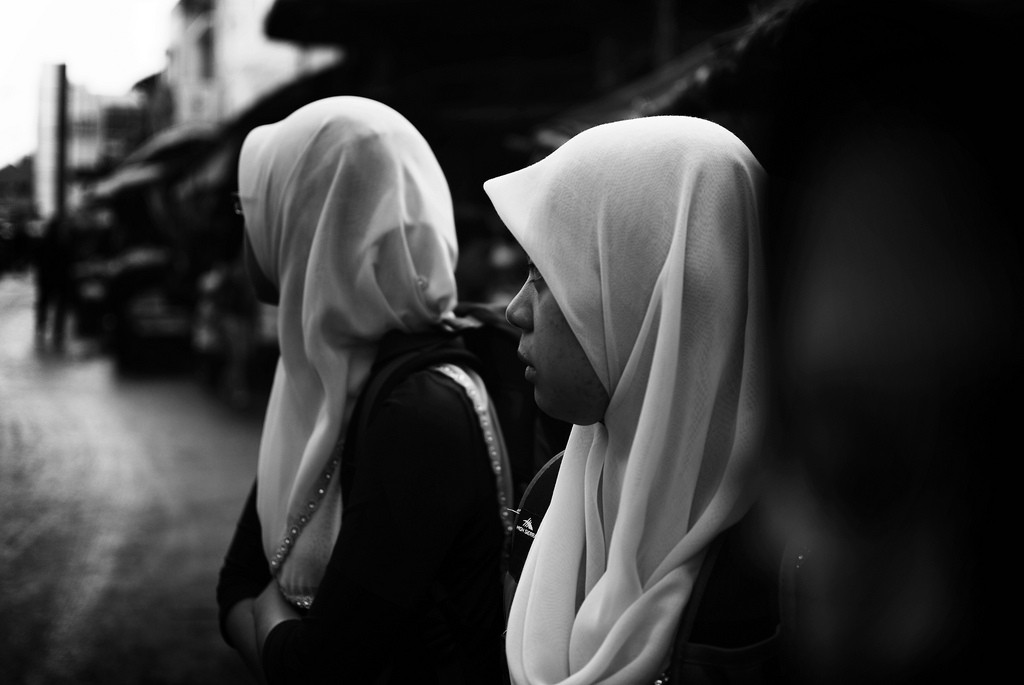
Credit: Haifeez/Flickr
INITIALLY, this was going to be a generic (and let’s be real, maybe, slightly high-horsey) thinkpiece about the sometimes controversial and misconstrued symbolism of hijab, a veil that covers the head and chest, which is worn by some Muslim women in the presence of adult males outside of their immediate family. In a twist of irony that was lost on me for an embarrassing amount of time, I was going to comment on the problematic nature of even well-meaning non-Muslim activists commenting on issues they weren’t personally equipped or qualified to, on behalf of Muslims. That is, until my editor was like: “Um, Katie, aren’t you non-Muslim?” Wait! I’m not like a regular non-Muslim, I’m a cool non-Muslim! Can I get you guys anything? Some snacks? A condom? Let me know! Oh, God love ya.
Anyways. Without further ado, allow me to introduce my special guests/hijab experts, three badass and beautiful women of varying ages, backgrounds, and opinions. They all identify as Muslim, and are all much more qualified than me to shed some light on this issue.
Monica, 22, is a Pakistani-American student at SF State studying biology. She’s part of the Muslim Student Alliance on her campus and likes drawing, dive bars, and watching embarrassing TV shows with her room mates on weekends.
Amani, 43, is an engineer and mother of two boys. She was born in Iran and initially came to the US to attend university. She plays tennis and is a fan of classical music — and Motown.
Kadijah, 65, was born Anne, but took the name Kadijah, after the first wife of the prophet Muhammad, upon her conversion four years ago. Kadijah is a proud grandma, and self-proclaimed “seeker.” Her favorite religious writing is the mystical Sufi poetry of Rumi and Hafiz.
Do you consider yourself religious?
M: Not as much as a lot of my friends, but yeah.
A: Somewhat, I’d say so.
K: Yes, definitely.
What does being a Muslim mean to you?
M: For me, I grew up Muslim. My faith is tied up with my family and childhood. My mom is really devout and into it, my dad not so much. But as a family we celebrate religious holidays when I visit home and stuff so Islam is like comforting.
A: Islam is a way of disciplining your faith, of giving it structure. I have a lot of mixed feelings about it, and organized religion in general, but its rituals and rules are more familiar to me than any other so that’s the faith tradition I choose.
K: I think Islam is beautiful. Maybe I’m still in the “honeymoon phase”! I was raised Presbyterian but Islam resonates with my soul so much more than that ever did. It just feels right. There’s a sense of wonder and awe to it, in a way, that I so identify with.
Do you choose to wear hijab? Why or why not?
M: No, I don’t. My mom and older sister do, but I chose not to. I wish I had a “deeper” reason but, honestly, I like my hair! And just wearing outfits without a scarf on my head. I don’t think it looks bad, and obviously it’s really meaningful for lots of people, but it’s not my style.
A: I do not. I grew up in a place, during a time, when covering your head and even your face in some situations was mandatory for women, so I don’t like being reminded of that. Honestly, and I mean no offense, I find the practice of hijab a bit archaic and unfair to women.
K: I do sometimes, which I know is unusual, and beside the point. But it’s something I’m still adjusting to.
Did you face any backlash or hardship as a result of your decision?
M: Not really. Sometimes when I hang out with my MSA friends who wear hijab I feel a little out of place. But they don’t make me feel that way. It’s just a little thing I can’t relate to. My mom was upset at first, when I told her I didn’t want to, but she’s OK with it now.
A: No. Actually, when I was younger, I did wear it for a while and my friends were, I suppose you could say, disappointed. The girls from home [in Iran] didn’t understand why I’d do such a thing if I didn’t have to.
K: My husband [a Muslim] is a bit uncomfortable with me wearing it. Since I converted after marrying him, I think he worries my children and friends will think it’s something he talked me into, which isn’t the case at all.
What do you think are some stereotypes of women who wear hijab?
M: I think some people think women in hijab are brainwashed or weak, like cult members or something. But Islam isn’t a cult, and actually a lot of the girls I know who wear it are some of the biggest feminists I know! They think it’s important to be valued for more than their looks, and wearing hijab makes that possible.
A: Submissive, subservient, controlled by the men in their lives. Also perhaps particularly devout and reverent.
K: I think there might be a perception that women in hijabs are different or “other.” I’ve noticed when I wear mine, people are less likely to talk to me or even make eye contact. But other women in hijabs are quick to exchange smiles. It’s like a special club in that way.
Has recent media coverage of Islam and terrorists who self-identify as Muslim affected your daily life? In what ways?
M: My daily life, not so much. Sometimes when people talk about ISIS they’ll look at me and be like “No offense!” which is awkward ’cuz like, um I’m not a fan of ISIS any more than you are, bro. My dad had an incident at the airport last month where he overheard someone not wanting to fly with him, and that makes me mad.
A: Not so much in daily life. We have a great community who is very open-minded and celebratory of differences. I do worry about my boys being given a hard time in school, but so far things haven’t been too bad. We talk a lot about extremism, how it’s dangerous in every context, and how a few “bad apples” don’t define an entire group of people.
K: Well, in a lot of ways I guess I don’t resemble the stereotypical Muslim. Of course, Muslims come in all colors and shapes and sizes, but you know what I mean. In a way I can “pass,” but I don’t want to. My faith is an important part of my identity. Sometimes families and friends will say things, and they don’t mean to be cruel, but they’ll say very ignorant things and I’ll have to decide whether or not to take a stand.
What would you like to tell activists who think the practice of wearing hijab is oppressive and want it banned/regulated?
M: I think I’d tell them that’s really uncool to people like my friends who are the farthest thing from oppressed. It puts them in a little box based on what they look like that has nothing to do with who they are. I understand that they might think they’re standing up for women, but they’re going about it all wrong.
A: I’d offer my opinion that the issue is a nuanced one, and without appropriate cultural, historical, and political context it should be approached with considerable caution. I’d urge them to look at practices in all religions and cultures that can possibly be misused to control or degrade women.
K: I’d tell them about how wearing hijab makes me feel closer to God, as well as my Muslim brothers and sisters. I’d explain that while a woman should definitely have a choice about what she wears, it’s invasive and unkind to condemn any of those choices.
What would you like to tell activists who think the practice of wearing hijab is positive and empowering, who wear it in solidarity (in spite of not being Muslim)?
M: I think it’s pretty cool, but I guess I’d want to make sure they were really wearing it in solidarity and not as a fashion statement. Hijabs are really special to some people, and it makes it seem like a joke or a fad to just wear it for the Instagram or whatever. Even if you tag your picture, like, “hashtag activism.”
A: I’d thank them for their kind intentions, but I’d want to remind them that for lots of women, for example, my mother, the hijab is in fact a reminder of a time in their lives where they felt not free in the least. And that maybe their efforts would be better directed into fighting against hate crimes or hate speech. Wearing the hijab is a nuanced, complex practice.
K: I think I’d be very touched by this. It would make me feel supported and understood, even by people who didn’t agree with my beliefs. I think there’s room for everyone to enjoy the traditions and ideas of Islam, even non-believers.
Any other thoughts that weren’t covered here?
M: Just that you shouldn’t judge someone without knowing their story. And you shouldn’t act out against something you don’t fully understand. Do your research.
A: That it’s just as harmful to see Islam through rose-colored glasses as it is to see it as inherently dangerous. And I say that as a Muslim. Movements, and religions are large movements, are only as progressive as they allow themselves to change to be. We’re following texts written thousands of years ago and edited heavily along the way. It’s ridiculous not to question anything.
K: Islam is ultimately about peace. Anyone who says otherwise just isn’t a real Muslim. Look at Christians: look at the Crusades, look at Westboro. Just because a crazy is proclaiming to be of a certain faith doesn’t make it true. It gives them power if we start to turn against each other. That’s what they want.
















